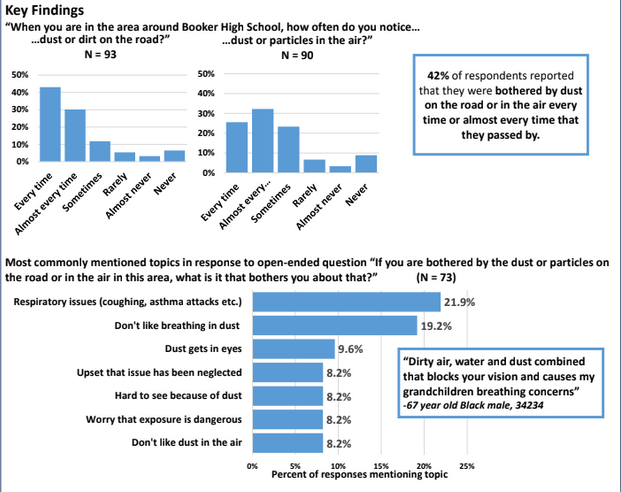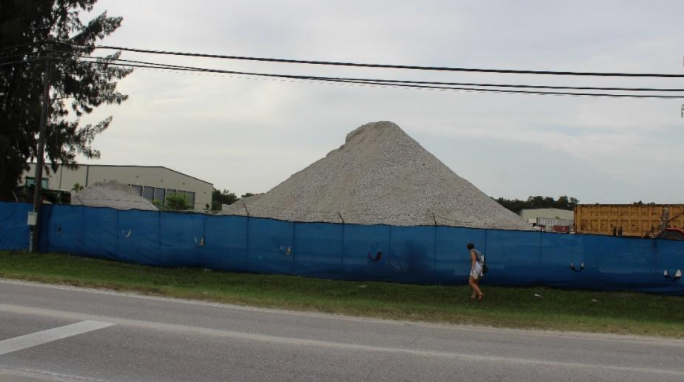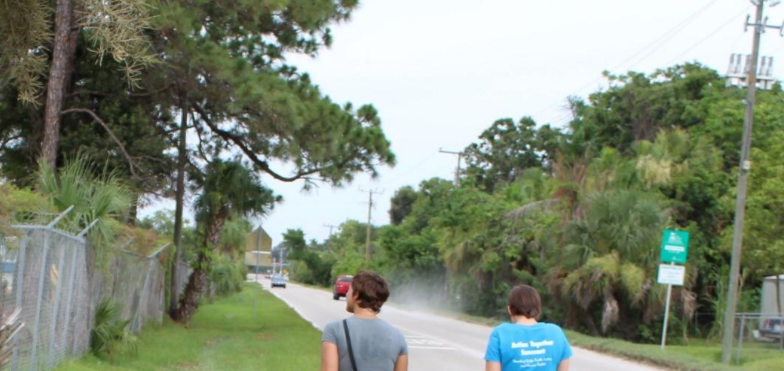Residents of Newtown are all too familiar with the numerous recycling plants situated at the edges of their neighborhood. Some of these plants have been there for decades, and more have been added over the years as building construction has boomed in Sarasota. But while business has been booming, so have the complaints of air, water and noise pollution.
The most notorious and potentially harmful irritant is air pollution coming from multiple concrete recycling plants in and around Newtown. The concrete is crushed, sending hazy clouds of dust over the surrounding area, including Booker High and Middle schools.
Chairman of the Newtown Community Health Action Team (CHAT) Joseph Mack is part of a task force that was organized to research the pollution, educate the community about the issues and advocate for a better quality of life.
Newtown CHAT consists of stakeholders from the community such as the Multicultural Health institute (MHI), New College of Florida, Suncoast Waterkeeper, the Amaryllis Park neighborhood association, the Sarasota Bay Estuary Program and other community leaders in Newtown.
Mack explained that “there’s a large asthma issue going on in the area.” A 2018 study titled Newtown Health Disparities & Environment and conducted by the task force provided data from Sarasota Memorial Hospital, which showed that more asthma-related ER visits came from the area where the plants are located than any other zip code in Sarasota County.
The 34234 zip code also happens to be the area where more than 72% of the city’s Black and African American population lives. The 2018 study highlights this fact, including the term “environmental racism” at the top of the infographic.
The study also included surveys of the Newtown area, asking how often residents observed dust or particles either on the roads or in the air near Booker High School. Over 70% of participants said that they saw dust on the roads every time or almost every time, and over 50% said they saw dust particles in the air every time or almost every time.

Participants also reported significant concern over respiratory problems from the dust particles. One Newtown community member interviewed—listed under the name “67 year old Black male”—was quoted saying that the dust and dirty air and water “blocks your vision and causes my grandchildren breathing concerns.”
While this study does not conclusively prove that the dust particles are from specific concrete plants—or that the dust is causing respiratory issues for residents—it did conclude that there should be heightened public caution and pressure to mitigate these issues, especially with such strong concerns from the community.
Project Coordinator for MHI and alum Onyx Hadwen (‘22) explained that residents exposed to these dust particles are at higher risk for “asthma” and “COPD, which stands for chronic obstructive pulmonary disease.”
Hadwen emphasized that more research needs to be done specifically on the Newtown area before conclusions can sufficiently be drawn, but based on the current information and past research on similar phenomena, these particles can cause a serious risk to people’s health—including “lung cancer, breast cancer and also cardiovascular disease and negative impacts on the heart.”

Another concern among residents is how the recycling plants are polluting nearby waterways, particularly Whitaker Bayou.
Founder of Suncoast Waterkeeper and lawyer Justin Bloom specializes in environmental issues, and has been a key asset in multiple cases against industries polluting our waterways.
“The water pollution ticket is multifaceted,” Bloom said. “Part of it has to do with flooding, and contaminated flood waters. The other has to do with the quality of the surface waters in Whitaker Bayou that flows through North Sarasota and Newtown area, and then the broader pollution concerns relating to Sarasota Bay, and how that can affect the community at large.”
Bloom has successfully brought suit against three specific recycling plants: Trademark Recycling, Suncoast Metals and Atlantic TMG. In all of these cases, Suncoast Waterkeeper will be overseeing the facility for a year following the suit, to ensure that the facilities are complying with their permits, which can mean installing storm water treatment systems, reducing the amount of waste created or other mitigations. As part of the terms, Trademark has paid $75K to local environmental programs, in lieu of paying fines.
“The concerns with water pollution, the health concerns related to that have more to do with red tide,” Hadwen explained. “And the top concern I would say with that is the people who are fishing out of the Whitaker Bayou.”
Fish caught out of contaminated waters can transfer pollutants back into the bodies of someone consuming them.
MHI found heavy metal pollutants in the waters that were discharged from these metal scrap and recycling facilities, including aluminum, copper, iron, lead and zinc, all of which can have significant negative effects on aquatic life. Lead and zinc in particular are lethal toxins that build up in the body and will have prolonged negative health effects over time.
Currently, MHI, Suncoast Waterkeeper and other organizations in collaboration with Newtown CHAT are trying to educate the community on the potential dangers at hand, and put pressure on the facilities and the government to finally clear the air for Newtown residents.

